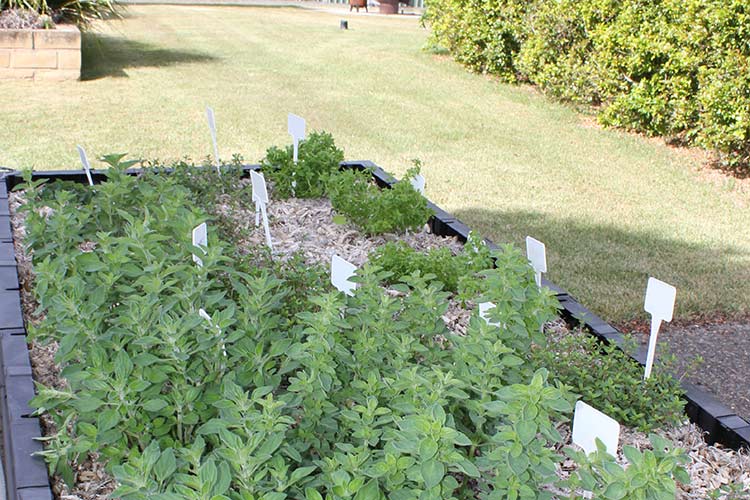Herbs can be grown anywhere in the garden but for those who love lots of fresh herbs, a dedicated herb garden can be a real joy.
Choosing a location for the herb garden is the first consideration, and is important to ensure the success of the herb garden. It will need a sunny space but in hot climates will need some shelter from the harsh western sun. In cold climates frost protection will be a consideration in allowing the garden to provide herbs all year round.
The herb garden should be situated where it is within easy reach of the kitchen. This is often nearby the back door. A herb garden can be highly ornamental and a lovely feature near the doorway to a home. If the herb garden is too far from the kitchen the herbs are much less likely to be picked as needed. Having the garden conveniently located will not only encourage you to harvest the herbs more often, it will greatly assist with timely care for the garden.
If you do not have garden space located conveniently to the kitchen, herbs can be instead grown in pots located by the back door, or in a kitchen window box. For more information on growing herbs in pots click here.
A garden space to grow herbs does not have to be large. As many herbs are used in small amounts a 1m square (approximately) area will allow sufficient space to grow numerous herbs for the average cook. If you prefer large amounts of all or any herbs, for example to make pesto’s, or if you use a lot of herbs in cooking, you will certainly appreciate a larger herb garden. Certainly if space permits, a larger herb garden will give you the opportunity to try many different herbs rather than only having room for your favourites.
Most herbs prefer good drainage, so if your soil is heavy you will need to improve the soil before your herbs will flourish in it. A raised bed can be an effective solution to growing herbs in heavy clay soils, and will also require less bending, making caring for and harvesting herbs easier as well.
Herbs will appreciate good soil, so before planting take some time to prepare the soil well by adding some composted organic matter. Organic matter will help to improve the drainage in heavy soils but will also help to strengthen sandy soils. Organic matter will also help to buffer any potential pH problems your soil may have and will help the soil hold moisture, nutrients and to generally create healthier soils. Organic matter can be incorporated as homemade compost or as bagged compost products available from hardware stores.
It is not advisable to add potting mix to garden beds so when creating a herb garden that needs added soil, always choose a product labelled as garden soil, and then also add some labelled as compost to provide the additional organic matter.
A dose of rock minerals will also help to ensure that the soil has a good compliment of trace elements. Trace elements will improve plant health generally but will also ensure stronger plants which are significantly less troubled by pests and diseases. Trace elements will also play a role in ensuring the plant has all the minor nutrients it requires for maximum flavour. Whilst starting with good quality herbs such as the Elite range of herbs will ensure you have plants which have been selected for excellent flavour, by adding rock minerals you will support those plants to reach their full flavour potential. Rock minerals (usually available on line or from nurseries and produce stores rather than hardware chains) is a very cost effective way of providing the soil with all the minerals needed for good plant growth.
Most herbs will be very happy in soil which has added compost and rock minerals. If your soil is poor, it can be a good idea to dig some nitrogenous fertiliser through before planting. A well balanced organic fertiliser is good for herbs, which generally do not like high doses of fertiliser.
If you have done a lot of digging and adding components to improve your soil, give it a good watering and allow it to settle for a week or so before planting into it.
When the bed is ready you can plant your herbs.
Choose herbs which you know you will eat and which you know will grow well in your climate. Many herbs are annuals so be aware of the time of year and if this is a good season to plant those herbs. In cold climates, after the last frost will be the best planting times, in hot areas it will be as the intense heat of summer starts to ease.
When planting herbs, allow them some room to grow, but you can usually plant them closer together than the label advises. The plants will then shelter each other, giving greater protection to the roots and reducing the need for mulch. By planting densely you will have a greater supply of herbs sooner and the herbs can be thinned as needed by harvesting for the kitchen.
Plan your planting so that larger and perennial herbs such as lemon grass and rosemary are towards the back of the bed and are not restricting your access to reach smaller herbs such as parsley and chives. If you have easy access on all sides of the bed, planting the tall herbs in the middle will allow them to provide some protection to the smaller herbs nearby from heat and frosts.
With good soil preparation and planning you should find the herbs do well and are quite easy to grow without needing a lot of care. As you achieve success with the herbs you use regularly, you can enjoy growing and using a wider range of herbs, giving you many more cooking possibilities.
*Article published by Kate Wall






